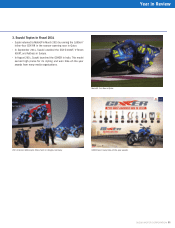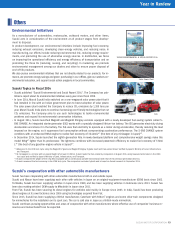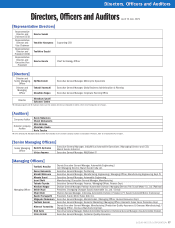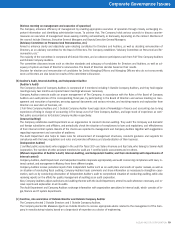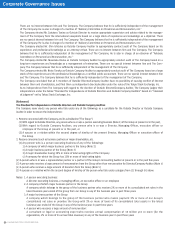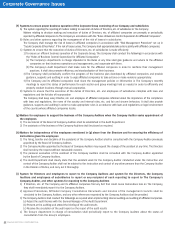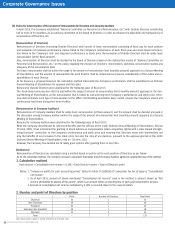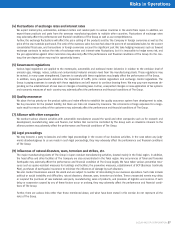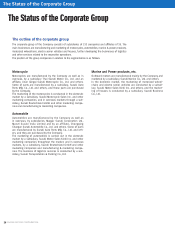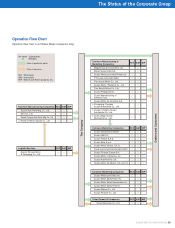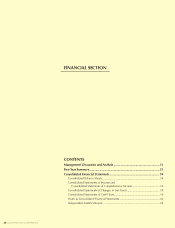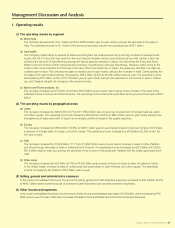Suzuki 2015 Annual Report Download - page 23
Download and view the complete annual report
Please find page 23 of the 2015 Suzuki annual report below. You can navigate through the pages in the report by either clicking on the pages listed below, or by using the keyword search tool below to find specific information within the annual report.
SUZUKI MOTOR CORPORATION 21
Corporate Governance Issues
5. A person who receives a large amount of donation:
A person who receives annual donation of 10 million yen or more (for the organization, a person directly involved
in activities which is the purpose of the donation) in any of the business year in past three years
(3) Development status of internal control system and risk management system
In order to enhance corporate governance, The Company is making efforts to keep everyone informed about compliance and to
strengthen internal control system. The basic policy of internal control system is as follows:
(a) Systems to ensure that Directors’ execution of their duties complies with laws and regulations and the Articles of Incorporation
1) Directors shall respect the “Mission Statement” and the “Suzuki Action Charter” and execute their duties in compliance
with the “Rules of the Board of Directors”, the “Approval Procedures” and other rules of the Company, and mutually
supervise their execution of duties through meetings of the Board of Directors, etc.
2) The Company established the “Suzuki Corporate Ethics Rules” witch lays out a set of basic points for Directors and
employees to act in a fair and faithful manner in compliance with the laws, the norms of the society and company rules
and observe the same. It is revised whenever necessary by “Corporate Ethics Committee” which promotes corporate
ethics in The Company.
3) Company Auditors shall audit the execution of duties of Directors in accordance with the audit policies and work
responsibilities set by the Board of Company Auditors.
(b) Systems relating to the storage and administration of the information in relation to Directors’ execution of their duties
Information relating to Directors’ decision-making and execution of duties shall be managed and stored in accordance with laws and
regulations and the rules of The Company, and be kept available whenever necessary.
(c) Rules and other systems relating to management of the risk of loss
1) The Company has set up the “Risk Management Procedure” as part of the “Suzuki Corporate Ethics Rules” to establish the risk
management system, and shall manage and cope with risks of losses in accordance with the same.
2) Decision shall be made, while important management matters are sufficiently deliberated, including risk evaluation, in the
meetings of the Board of Directors and through the approval system in accordance with the deliberation standard.
3) Risk that is expected to arise with regard to the execution of operation of departments such as engineering, production or
sales shall be handled by each department in accordance with the rules of or manuals on the prevention or handling of
such risk.
4) To prepare for the occurrence of disasters, The Company shall develop behavior manual and Business Continuity Plan (BCP),
take out insurance or provide training, or other suitable measures.
(d) Systems to ensure that Directors’ execution of their duties is made eciently
1) As the basic system to ensure that Directors’ execution of their duties is made eciently, the meetings of the Board of Directors
shall be held in principle every month and at any time whenever necessary. And management councils shall be held when
ever necessary to discuss the strategic decision on execution of important management issues.
2) The operational organization shall be revised from time to time in order to clarify the responsibility, strengthen the cooperation
among the concerned sections and establish ecient business operational systems.
3) Business shall be eciently operated by developing the business plan, periodically conrming the progress of the plan, taking
measures and making revisions from time to time.
(e) Systems to ensure that employees’ execution of their duties complies with laws and regulations and the Articles of Incorporation
1) In addition to (a) 2) above, The Company shall keep every employee informed about the “Suzuki Employees’ Action Charter”
which lays out the norms of action of employees to ensure that employees’ execution of their duties complies with laws
and regulations and the Articles of Incorporation, and revises the same whenever necessary.
2) The Company shall keep every employee informed about the “Action Procedures” and the “Division of Duties” which set up
the proceedings of execution of their duties in details, and other rules of the Company, and revise the same whenever necessary.
3) In accordance with the “Suzuki Corporate Ethics Rules” mentioned in (a) 2) above, the Company shall develop the compliance
system for employees, and educate them through various training and in-house seminars regarding compliance.
4) The Company shall make its employees report the fact of violation or suspected violation of laws or regulations, and establish
the consultation oce with which employees can consult on such fact, etc. or which they can notify in order to promptly
detect it and take corrective measures or actions to prevent the reoccurrence.
5) In accordance with the “Rules of Internal Auditing”, the Audit Department shall audit on the integrity and eciency of various
control systems, organizations and rules, and properness of function of internal control, etc.


